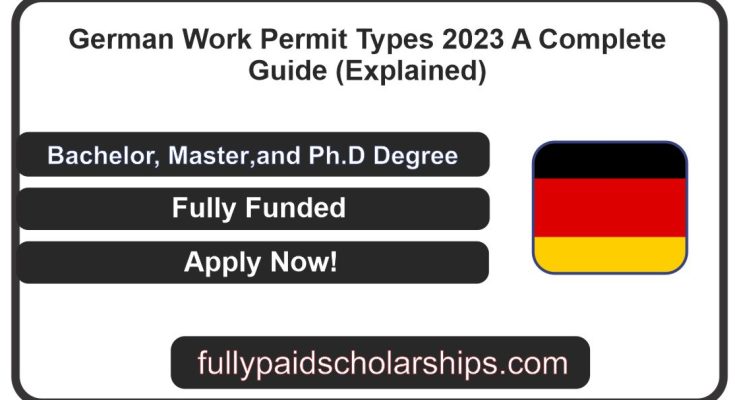Types of German Work Permits in 2023 As an advantage of living in and being a permanent resident or citizen of a European Union country, you do not need as many permits from different countries as non-EU citizens do. You can enter any EU-friendly country without a visa or permit if you have your ID and passport with you. These documents will assist you in registering once you enter the country and remain for more than three months. That is all! Easy as pie!
For candidates who do not belong to the EU, EEA, or Switzerland, a visa is required to enter the country, and a residence permit is required to remain in Berlin, Germany. Therefore, we are here to explain what type of visa you require, why, and under what conditions. Maintain your focus so that you can understand all procedures.
For more information on Germany’s work permit types, see the information provided below.
German Work Permit Types 2023 Details
- Country: Germany
- Eligible Countries: International Applicants
- Category: Work Permit Types
Also, Check Switzerland Work Visa Process 2023
Which countries Don’t require a work visa for Germany?
The following countries are exempted from Germany visa but are bound to register upon their stay in Germany, such as;
- Australia
- Canada
- Israel
- Japan
- South Korea
- New Zealand
- USA
The above-mentioned countries are also eligible to enter, stay, get a residence permit, and apply for a work permit without any job offer.
Where to apply for registration?
All foreigners can register once they intend to stay for longer, at the Ausländerbehörde or foreigners office to get their residence permit.
Types of German Work Permits 2023.
All candidates from non-EU/EEA countries are requested to apply for a German visa before entering the country. With a visa, you are allowed to step into the country.
To make it easier for you, we have gathered a list of types of German Work Permits to avoid making mistakes because once you get a short study visa, it cannot be converted into a long-stay visa. Which means you have to be careful about choosing your visa type.
Note: to apply for a German visa, you must show proof of a job or any educational program in Germany.
Let’s discuss the types of German permits.
#1. Study:
The study visa is also a temporary residence permit that allows you to enter the country based on studying at any university in Germany. The visa expires as the duration of the degree program finishes, but it can be extended for up to 18 months if you want to find work in Germany.
#2. Temporary Residence Permit:
As mentioned in the title, it is a temporary or a limited residence permit valid for up to one year. But the TRP can also be extended in the same terms you applied for the first time; any changes to your situation will no longer help in your extension.
The temporary Residence permit is a purpose-specified visa. Which only allows you to do a specific activity to apply for. It is also the most common type of German visa, paving the way for another long-term visa. It is further divided into the following categories;
#3. Employment:
This temporary residence permit is for employment plans and is usually aligned with the length of your contract. Suppose your employment contract is for 2 years; your visa will also be valid for 2 years.
#4. Marriage:
This type of German visa is issued to those candidates who are married to a German National or German permanent resident. After 2 years of marriage and spending 3 years in Germany together, the spouse can also apply for permanent residency. For this purpose, you must have a B1-level German.
#5. EU Blue Card:
The EU Blue Card is issued to highly skilled professionals. To qualify for this permit, you must hold a degree in bachelors and a master. You must also have a good grasp of the German language. Candidates are requested to apply for roles corresponding to their field of study.
The visa is issued to mostly candidates belonging to the field of IT, mathematics, or engineering. One more condition is that the applicant’s job must allow them to earn up to €50,800 Per year. The validity of the Blue Card is 4 years, and you are also allowed to bring your spouse with you.
#6. Freelancer/Artist:
There is no specific visa for Artists, but you can ensure your intentions, state your identity, and apply for the same visas mentioned above. Make sure to define your role working as a freelancer. Freelancer visits are only granted at the Friedrich-Krause-Ufer Ausländerbehörde, not the Keplerstraße one.
#7. German Permanent Residence/Settlement Permit:
The German permanent residence or settlement permit is issued to those candidates who have had a temporary Residence permit or EU Blue Card and have spent a few years in Germany. You must present proof of working for 5 years in Germany and that you have paid all the relevant taxes during that time.
After that, you will be given a German test which is quite difficult, and candidates must prepare for it beforehand. These elements will allow you to stay and travel in and out of the country for a very long period. The permit also allows you to bring your children and spouse.
Application Process for Germany Work Permit 2023.
Required Documents:
- A valid passport
- Clean criminal background records
- Minimum B1 German language proficiency (only for a blue card or permanent residency)
- German health insurance
- Financial stability
- A job offer from the employer (if employed)
- Proof of University admission (if student)
- Marriage certificate (in case you are joining your spouse)
How to Apply for German Work Permit?
The application process is similar to any other visa application; you will need to do the following things;
- Register your address at Bürgeramt
- Get insurance for German health
- Open a bank account
- Fill out the application form at the Ausländerbehörde
- Book your appointment
- Show up in the interview
- And pray for your selection.
Related Post: Australia Work Visa Types 2023
Conclusion
Today in this post, we have discussed all the details regarding the Germany Work Permit types; if you are looking for work opportunities in Germany and you are an international applicant, then don’t miss out on reading out this post.
Please also do follow our Facebook Page ,WHATSAPP GROUP,, Telegram Group, Youtube Channel for the latest Scholarship Opportunities update




